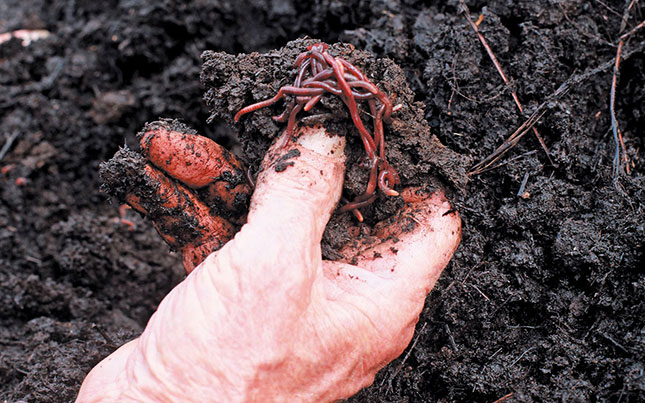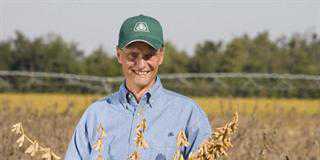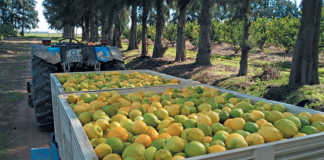
On their 3 000ha farm between Warden and Harrismith in the Free State, David Leslie and his son James grow approximately 700ha potatoes, 600ha maize, 600ha speckled sugar beans and 600ha soya beans under the name Sesisonke.
The entire operation is run under conservation agriculture practices, a move the Leslies made about eight years ago, after soil samples yielded puzzling results.
“When we broke up virgin soil adjoining a land we had often used before, samples showed that the old soil had sufficient levels of all nutrients, whereas the new soil was deficient in everything,” David recalls.
“Yet the crop planted in the new soil performed better than the crop in the old soil – despite the supposed deficiency. We didn’t know what was going on.”
At roughly the same time, David had asked an agronomist to classify a piece of land that he wanted to acquire. This land’s soil quality was extremely poor, with virtually no humus content.
Following these incidents James attended a course by well-known Australian conservation agriculturalist, Graeme Sait. Here he learnt about the critical and complex role of humus in the soil and how a farmer could use earthworms and their by-products to build up humus content.
Today, the Leslies spray about 250 000l of worm tea (vermitea) as a foliar spray on their farm’s crops annually.
Producing worm tea involves:
- Producing the correct type of compost appropriate for the earthworms;
- Feeding the worms;
- Harvesting the worm excrement (vermicast or worm castings);
- Brewing the tea.
Making compost
Initially, David contracted the compost-making process to vermiculture professionals. Disappointed with their results, he took over the reigns himself and has managed the enterprise successfully since then. He has four permanent workers to oversee the vermicast- and vermitea-production processes.
The Leslies use sheep manure, which they buy from feedlots, mixed with an equal volume (not weight) of grass to create compost. Old bales are often used in this mixture. The compost has to remain at a temperature of 50°C to 65°C. During the process, David takes readings as often as three times a week to ensure the temperature does not exceed 65°C.
During the process, David takes readings as often as three times a week to ensure the temperature does not exceed 65°C.
Should it climb too high, water is sprayed on the mixture to cool it down. Alternatively, an entire strip is turned with a compost turner, which aerates it and lowers the temperature.
The compost tends to have an unpleasant smell at first. When the smell disappears, it is ready to be fed to the worms. At this stage, the temperature has decreased to less than 40°C.
Harvesting vermicast
The next stage involves sandwiching the compost and grass together to form beds. Keeping the worms’ food homogenous is crucial.
Earthworms thrive at temperatures of between 28°C and 33°C, and this range is maintained by either irrigating or mixing in grass.
To harvest the worm castings, the team simply irrigates one side of the beds. The earthworms migrate to that side, and the dry castings can be harvested.
Once this process is complete, new compost is added to the now empty dry side of the bed, which is irrigated in turn. The worms then move to this side, and the process begins again. Around 60t of compost is fed to the worms per month, while approximately 1 000t of vermicast is harvested annually.
With Sesisonke growing crops on more than 3 000ha, the amount of vermicast produced is insufficient. Irrigated, high- yield potatoes are the only crop that receives vermicast directly; the rest are treated with worm tea with a vermicast base.
Brewing tea
The Leslies’ current worm tea brewing process is the third method attempted, and it has proved highly effective. The first process required 5 000l of water for every 1 000l of worm tea, and processing this volume of water was a logistical challenge.
The method was also disruptive as it involved washing the worms out of the compost. The second process was aerobic and thus had the potential to spoil quickly.
In the current process, vermicast is used as a base and mixed with water in large plastic containers in an anaerobic fermentation process.
A number of ingredients are added: lucerne at a ratio of 0,4%; molasses for energy (1% to %) and fermentation; hydrogen (0,8%) as a disinfectant; and organic marine fertilisers, such as Seagro, at 0,5% to increase various bacteria species.
Worm tea does not spoil and can be stored for up to a year. None is sold; all is used on Sesisonke and applied using a spray or a centre pivot. “Vermitea is easy. If you have to spray a land 50km away, you simply load 50 x 25l cans and it’ll be enough for 50ha,” says David.
Benefits
Soil treated with worm tea has a better structure, more body and a healthier general appearance. Despite these obvious advantages, the Leslies have not carried out extensive measurements.
“There are too many other contributing factors,” explains David. “We also keep stover on the lands and use no-till practices. We plant cover crops – legume, rye grass, turnips and radish – with a sugargraze base. Turnips and radish help to break up the soil. So it’s a whole combination. We can’t point at one thing and say the worms specifically have an effect on it.”
Nonetheless, humus content across the farm has improved drastically, and applying worm tea has resulted in significantly less chemical usage. “We’ve had cases where we have been cleaned out by hail and the assessment showed 90% damage to a potato crop.
We kept spraying vermitea and ended up harvesting 40t/ ha – even though all the plants were damaged beyond repair. We also had an incident where Roundup was sprayed on crops by mistake. Again we kept spraying with vermitea and they recovered.”
Two additional benefits have emerged from the use of worm tea. David and James discovered that livestock prefer plants treated with worm tea. While growing Eragrostis, David noticed that sheep, cattle and horses fed on sections of the land that had been sprayed with vermitea and avoided other areas.
Crop shelf life has also improved: “Buyers tell us the shelf life on our potatoes is above anything else they get in the market.”
Although 250 000l of worm tea a year are sprayed on crops on Sesisonke, additional nitrogen, phosphorous and potassium are still necessary. Approximately 60t of fertiliser is mixed on the farm daily. All mixes are land- and crop-specific, and are only tabled and applied following soil analysis.
Leaf samples are also taken, and top dressing and foliar feeds are applied according to results. All soil samples are sent to US-based laboratories, as the Leslies are not satisfied with the performance of local laboratories. Worm tea is sprayed on all lands, regardless of the soil analysis results.
According to David, managing the farm is intensive and keeping up to date with conservation agriculture approaches is difficult. It would be far easier to simply use fertilisers without worm tea. But they remain committed to conservation farming and vermiculture.
”We believe we have to improve the soil and make it sustainable for generations to come. It’s not just for our own good,” he says.
For more information contact James Leslie on 082 339 6643.













